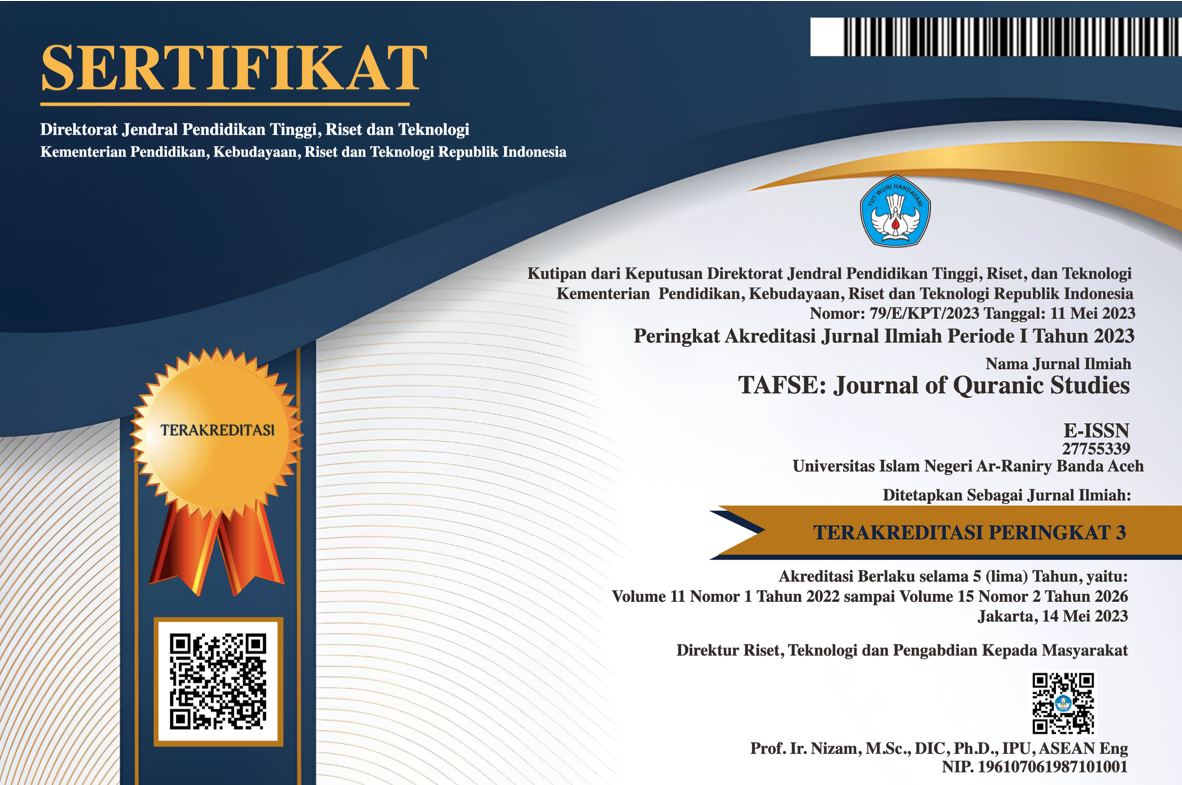The Minimalist Lifestyle as Qur’anic Practice: A Living Qur’an Study of Surah Al-A‘raf Verse 31 among UIN Sunan Kudus Students
DOI:
https://doi.org/10.22373/ceax9j80Keywords:
Living Qur’an, minimalist lifestyle, Surah Al-A‘raf verse 31, isrāf, youth religiosity, ethical consumption, phenomenologyAbstract
This study explores how students at UIN Sunan Kudus interpret and practice the message of Surah Al-A‘raf verse 31 through the adoption of a minimalist lifestyle. Using a qualitative phenomenological approach within the Living Qur’an framework, the research investigates how this verse functions not as a distant command, but as a daily reference for living with purpose, moderation, and awareness. Data were collected through in-depth interviews and participant observation involving 15 students who had adopted minimalist habits for at least six months. The findings show that the call to avoid isrāf (excess) is understood by students as a principle that shapes their choices in spending, organizing priorities, and managing time. Minimalism, in their view, reflects Islamic values such as moderation (wasatiyyah), contentment (qanā‘ah), and gratitude. It also supports clarity of mind, self-restraint, and a more focused approach to both academic and spiritual life. Several students described how this practice helped them respond to social pressures and consumerist habits within their peer and family environments. Rather than being seen as a trend or ideal, minimalism became part of how they carried their faith into daily routines. Surah Al-A‘raf verse 31, as they lived it, offered practical guidance in navigating choices—grounded not in theory, but in the rhythm of ordinary life.
Downloads
References
Amin, Muhammad, and Muhammad Arfah Nurhayat. Resepsi Masyarakat Terhadap Al-Quran (Pengantar Menuju Metode Living Quran). 21, no. 2 (2020).
Chatzidakis, Andreas, et al. “Post-Growth Consumption and the Narratives of Voluntary Simplicity.” Consumption Markets & Culture 26, no 2023. https://doi.org/10.1080/10253866.2022.2134556.
Jalili, Monire, Michael S Pangburn, and Alireza Yazdani. “Trend-Chasing Versus Minimalism: Selling Fewer, Better Products to Fashion-Sensitive Customers.” Production and Operations Management 33, no. 4 (2024): 922–42. https://doi.org/10.1177/10591478241234996.
Kementrian Agama RI. Al-Qur’an Dan Tafsirnya, Jilid 1. Jakarta: Lentera Abadi, 2010.
Kotler dan Keller,. Manajemen Pemasaran,. Jakarta: Erlangga, 2012.
Malik, Faiza, and Muhammad Ishtiaq Ishaq. “Impact of Minimalist Practices on Consumer Happiness and Financial Well-Being.” Journal of Retailing and Consumer Services 73 (2023): 103333. https://www.sciencedirect.com/science/article/pii/S0969698923000802.
Minton, Elizabeth A., Lynn R. Kahle, and Mary Anne Raymond. “Sustainable Consumption among Millennials: Exploring the Roles of Identity and Values.” 2023, 113624. https://doi.org/10.1016/j.jbusres.2023.113624.
Naeem, Muhammad, et al. “Role of Social Influence and Environmental Concern in Sustainable Consumption: A Multi-Group Analysis.” Sustainable Production and Consumption 30, 2022, 319–29. https://doi.org/10.1016/j.spc.2021.12.006.
Natasa, Natasa, Badarussyamsi Badarussyamsi, and Ermawati Ermawati. “Living Qur’an Dalam Tradisi Nujuh Bulanan.” Journal of Comprehensive Islamic Studies 1, no. 1 (2022): 1–16. https://journal.centrism.or.id/index.php/jocis/article/view/33.
Ningrum, Nabila Ayu. ““Paralelitas Nilai-Nilai Tasawuf Dalam Buku Goodbye, Things: Hidup Minimalis Ala Orang Jepang Karya Fumio Sasaki Dan Relevansinya Dengan Kehidupan Modern".” PhD Thesis, UIN SUNAN KALIJAGA YOGYAKARTA, 2021. https://digilib.uin-suka.ac.id/id/eprint/46439/.
Patton, MQ. Metode Penelitian Dan Evaluasi Kualitatif. Ke-4. SAGE Publications., 2015.
Prof Dr Wahbah az-Zuhaili. Al-Tafsir al-Munir Fi al-’Aqidah Wa al-Syari’ah Wa al-Manhaj. Damaskus: Dar al-Fikr, 2009.
Rasheed, A.K. Fazeen, and Janarthanan Balakrishnan. “Sharing More, Owning Less: How Consumer Minimalism Drives the Sharing Economy.” Journal of Promotion Management 30, no. 3 (2024): 333–59. https://doi.org/10.1080/10496491.2023.2279769.
Raza, Sobia, et al. “Influence of Religiosity on Sustainable Consumption Behavior: A Study on Halal Products.” Journal of Islamic Marketing 12, no 2021, 752–70. https://doi.org/10.1108/JIMA-01-2020-0003.
Shihab, Moh Quraish. Tafsir Al-Mishbāh: Pesan, Kesan, Dan Keserasian al-Qur’an. Cet. 6. Lentera Hati, 2005.
Smith, JA, Flowers, P., & Larkin, M. Analisis Fenomenologi Interpretatif: Teori, Metode, Dan Penelitian . SAGE Publications., 2009.
Sri Wening. Waspada Konsumerisme Kiat-Kiat Menghambat Melalui Pendidikan Karakter. Sukoharjo: Rumahaksara, 2014.
Supelli, K. Instanisasi Dan Hedonisme Dalam Pesona. 2003.
Susanti, Rizky, and Ahmad Sulaiman. “Minimalisme Dan Zuhud: Perbandingan Gaya Hidup Barat Dan Islam Serta Manfaatnya Bagi Kesehatan Mental.” Cognicia 10, no. 1 (2022): 1. https://doi.org/10.22219/cognicia.v10i1.20672.
Susanti, Rizky, and Ahmad Sulaiman. “Minimalisme dan zuhud: Perbandingan gaya hidup barat dan islam serta manfaatnya bagi kesehatan mental.” Cognicia 10, no. 1 (2022): 28–33. https://doi.org/10.22219/cognicia.v10i1.20672.
Wang, Yu, and Julia Glaesmer. “Minimalist Lifestyles and Emotional Regulation in Youth: A Cross-National Study.” no 2024, 33–48. https://doi.org/10.1002/ijop.13099.
Xiaoming Chen et al.,. ““When Less Is More: Understanding Consumers’ Responses to Minimalist Appeals,”.” Psychology & Marketing 40, no. 3 (2023) (n.d.): 418–34. https://doi.org/10.1002/mar.21760.
Downloads
Published
Issue
Section
License
Copyright (c) 2025 Dwi Ayu Lestari, Ahmad Atabik, Althaf Husein Muzakky

This work is licensed under a Creative Commons Attribution-NonCommercial 4.0 International License.
Authors who publish with this journal agree to the following terms:
- Authors retain copyright and grant the journal right of first publication with the work simultaneously licensed under a Creative Commons Attribution License (CC BY NC 4.0) that allows others to share the work with an acknowledgment of the work's authorship and initial publication in this journal.
- Authors are able to enter into separate, additional contractual arrangements for the non-exclusive distribution of the journal's published version of the work (e.g., post it to an institutional repository or publish it in a book), with an acknowledgment of its initial publication in this journal.
- Authors are permitted and encouraged to post their work online (e.g., in institutional repositories or on their website) prior to and during the submission process, as it can lead to productive exchanges, as well as earlier and greater citation of published work (See The Effect of Open Access).





